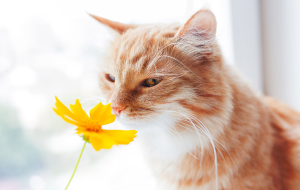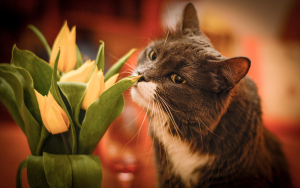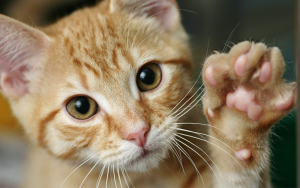Why Is My Cat Drooling? Causes, Concerns, and Solutions

Cats are known for their grace, independence, and meticulous grooming habits. So, when your feline friend starts drooling unexpectedly, it can be both alarming and perplexing. Is it a sign of contentment, or could it point to a health issue? In this article,
we will explore why cats drool, when it’s normal, when it’s not, and how you can address the issue effectively.
Understanding Cat Drooling: The Basics
Drooling in cats occurs when excess saliva builds up in their mouths and escapes past their lips. While occasional drooling may not be a cause for concern, excessive or persistent drooling (also called hypersalivation) often indicates an underlying issue.
Cats drool for a variety of reasons, ranging from emotional responses to medical conditions. Understanding the context in which your cat is drooling is the first step toward addressing the problem.
Common Reasons Cats Drool
1. Normal Drooling Due to Relaxation or Happiness
Cats sometimes drool when they’re completely relaxed and content. For instance, if your cat purrs while being petted, a small amount of drooling might accompany this moment of bliss. This type of drooling is harmless and typically stops once the petting
or purring ceases.
2. Stress or Anxiety
Stressful situations, such as a trip to the veterinarian, meeting new pets, or loud noises, can cause your cat to drool temporarily. Stress-induced drooling is usually short-lived and resolves once the cat calms down.
3. Motion Sickness
Some cats experience motion sickness during car rides or other forms of travel. This can lead to nausea, drooling, and even vomiting. Ensuring your cat is comfortable during trips can help reduce motion sickness.
When Drooling May Indicate a Health Problem
1. Dental Issues
One of the most common medical reasons for drooling in cats is dental disease. Conditions like gingivitis, tooth abscesses, or oral ulcers can cause pain and excessive salivation. Look for other signs like bad breath, difficulty eating, or pawing at the
mouth.
2. Foreign Objects in the Mouth
Cats are curious creatures and may accidentally get small objects, such as strings, fish bones, or toys, stuck in their mouths. This can cause irritation and lead to drooling. If you suspect your cat has something lodged in its mouth, a visit to the vet
is essential.
3. Poisoning or Toxins
Ingesting toxic substances—such as household plants (like lilies), cleaning chemicals, or certain human foods (like chocolate or onions)—can lead to excessive drooling. Poisoning may also cause symptoms like vomiting, lethargy, or seizures.
4. Nausea or Digestive Issues
Cats may drool when they feel nauseous due to an upset stomach, motion sickness, or other digestive issues. If your cat is also vomiting or refusing food, nausea might be the cause.
5. Upper Respiratory Infections
Respiratory infections, often caused by viruses or bacteria, can lead to inflammation in a cat’s nasal and oral passages, making swallowing difficult and causing drooling. Other symptoms may include sneezing, coughing, or a runny nose.
6. Oral Tumors or Growths
Tumors or growths in the mouth can interfere with normal swallowing, leading to drooling. These may require a biopsy for proper diagnosis and treatment.
7. Neurological Disorders
Neurological conditions, such as seizures or nerve damage, can impair a cat’s ability to control its muscles, including those involved in swallowing. This may result in drooling, among other symptoms.
How to Identify the Cause of Your Cat’s Drooling
When trying to determine why your cat is drooling, consider the following:
- Context: Is your cat relaxed, stressed, or sick?
- Duration: Is the drooling occasional or constant?
- Additional Symptoms: Are there signs of pain, vomiting, appetite loss, or changes in behavior?
It’s always best to consult your veterinarian if you’re unsure about the cause of your cat’s drooling.
What Should You Do if Your Cat Is Drooling?
1. Assess the Situation
If the drooling is minor and your cat appears happy and healthy, monitor them for changes. Occasional drooling during relaxation may not require any action.
2. Check for Visible Issues
Carefully inspect your cat’s mouth for signs of injury, foreign objects, or swelling. If you notice anything unusual, don’t attempt to remove it yourself; visit your veterinarian for help.
3. Ensure a Safe Environment
Keep toxic substances, harmful plants, and small objects out of reach. Cats are natural explorers, so prevention is key.
4. Monitor Stress Levels
If stress seems to be the trigger, try to identify and eliminate the source of anxiety. Provide your cat with a quiet, safe space and consider using calming aids like pheromone sprays or diffusers.
5. Visit the Vet
If your cat’s drooling is excessive, persistent, or accompanied by other concerning symptoms, schedule an appointment with your veterinarian. Diagnostic tests, such as blood work or X-rays, may be necessary to identify the cause.
Preventing Excessive Drooling
While not all causes of drooling can be prevented, there are steps you can take to reduce the risk:
- Regular Dental Care: Brush your cat’s teeth, provide dental treats, and schedule annual dental checkups.
- Healthy Diet: Feed your cat a balanced diet to promote overall health.
- Routine Vet Visits: Regular veterinary checkups can help catch health issues early.
- Safe Environment: Remove potential toxins and hazards from your home.
When to See a Veterinarian
Seek immediate veterinary care if your cat’s drooling is accompanied by:
- Vomiting
- Loss of appetite
- Lethargy
- Swelling or bleeding in the mouth
- Difficulty breathing
Timely intervention can prevent serious complications and ensure your cat gets the care they need.
Conclusion
While occasional drooling in cats is often harmless, persistent or excessive drooling may signal a deeper issue. By understanding the potential causes and seeking prompt veterinary care when needed, you can help your feline companion stay healthy and
happy.
If you have concerns about your cat’s drooling, don’t hesitate to consult your veterinarian. Your vigilance and care can make all the difference in your pet’s well-being.







